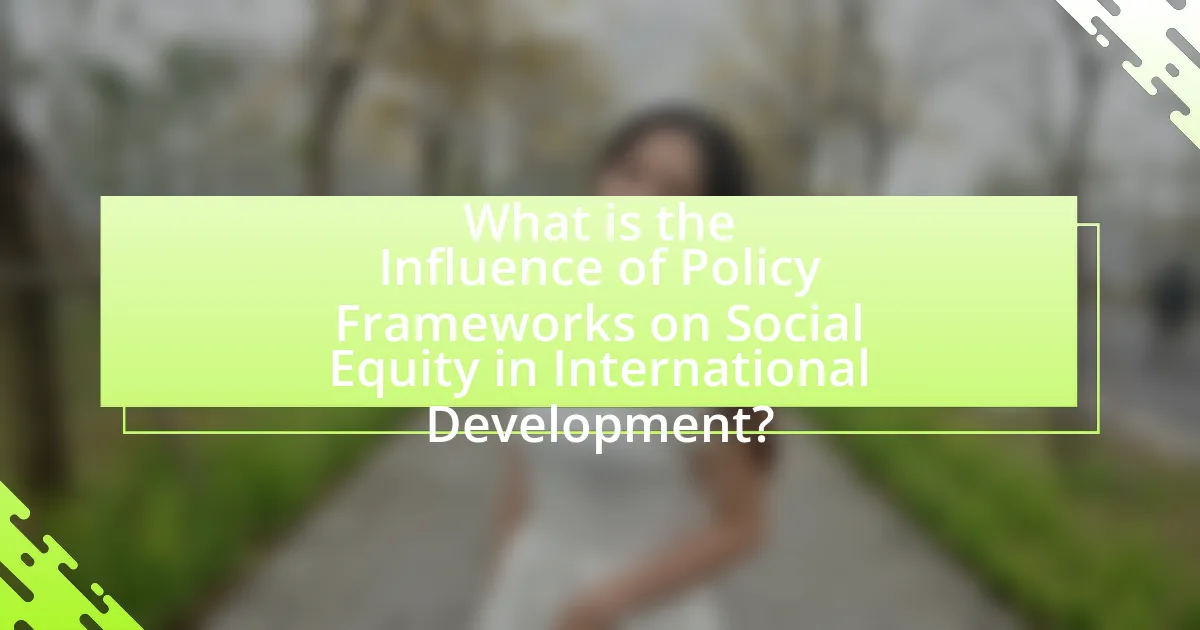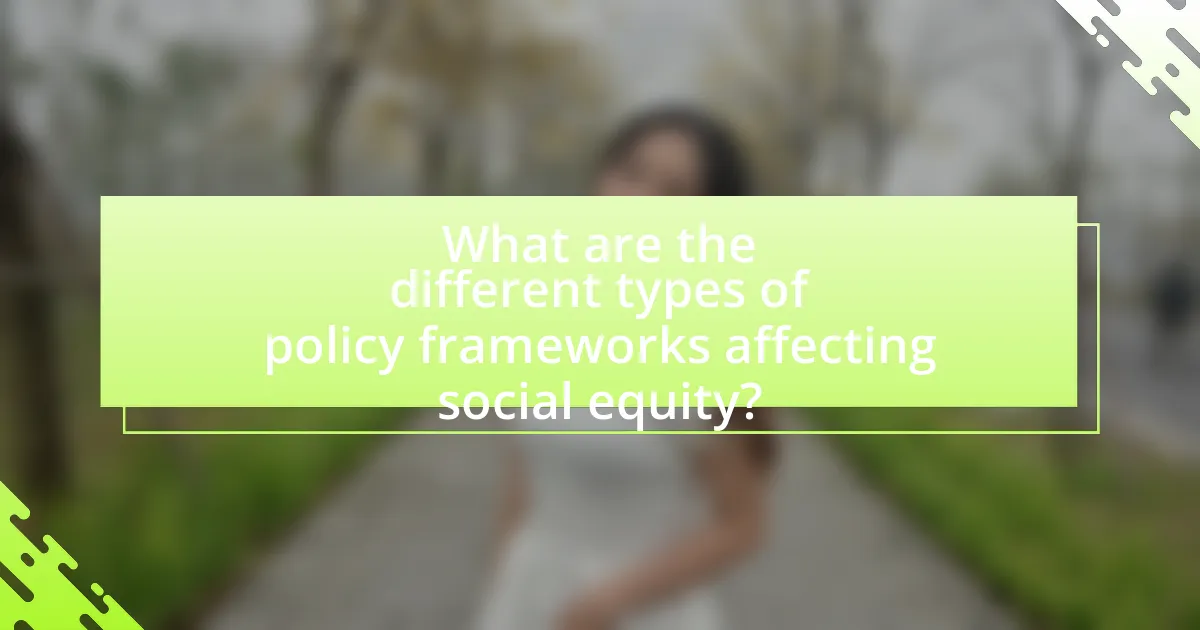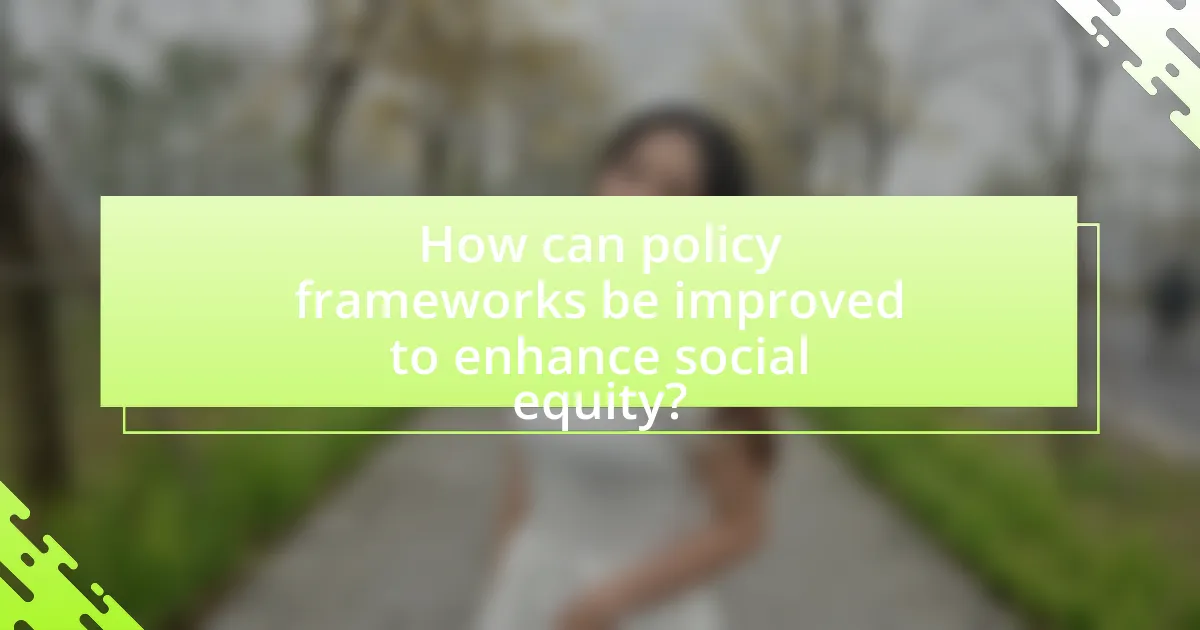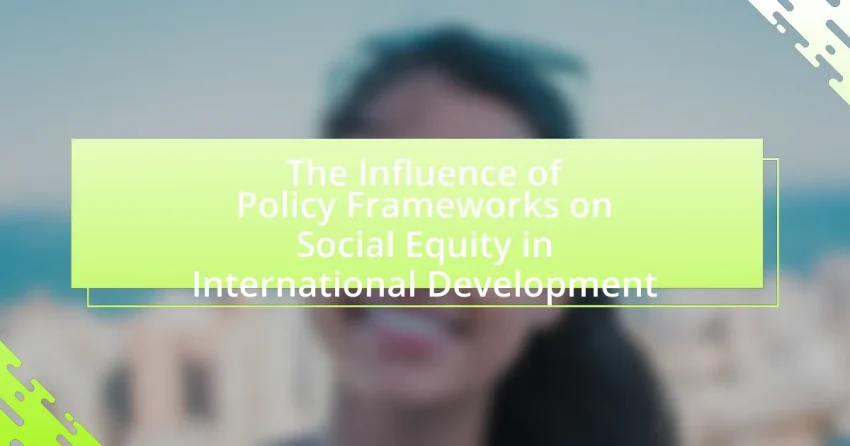The article examines the influence of policy frameworks on social equity in international development, highlighting how these frameworks establish guidelines that shape resource allocation and access to services for marginalized groups. It discusses the key components of effective policy frameworks, such as inclusive participation and equitable resource distribution, and their impact on social equity outcomes. The article also explores the importance of social equity in achieving sustainable development goals, the role of international agreements, and the challenges policymakers face in promoting equity. Additionally, it outlines strategies for improving policy frameworks to enhance social equity, emphasizing the need for targeted interventions and stakeholder engagement.

What is the Influence of Policy Frameworks on Social Equity in International Development?
Policy frameworks significantly influence social equity in international development by establishing guidelines that shape resource allocation, access to services, and opportunities for marginalized groups. These frameworks often prioritize inclusivity and equity, ensuring that development initiatives address the needs of disadvantaged populations. For instance, the United Nations’ Sustainable Development Goals (SDGs) emphasize reducing inequalities and promoting social inclusion, which directly impacts policy decisions at national and local levels. Research indicates that countries implementing comprehensive policy frameworks that focus on social equity experience improved outcomes in health, education, and economic participation among marginalized communities, thereby reinforcing the importance of such frameworks in achieving equitable development.
How do policy frameworks shape social equity in international development?
Policy frameworks shape social equity in international development by establishing guidelines and standards that promote fair resource distribution and access to opportunities. These frameworks, such as the Sustainable Development Goals (SDGs), aim to reduce inequalities by addressing systemic barriers faced by marginalized groups. For instance, the SDGs specifically target poverty reduction, gender equality, and inclusive education, which are essential for fostering social equity. Research indicates that countries implementing comprehensive policy frameworks experience improved social outcomes, as evidenced by the World Bank’s findings that inclusive policies can lead to a 30% reduction in poverty rates. Thus, effective policy frameworks are crucial for advancing social equity in international development.
What are the key components of policy frameworks that impact social equity?
Key components of policy frameworks that impact social equity include inclusive participation, equitable resource distribution, and targeted interventions. Inclusive participation ensures that marginalized groups have a voice in decision-making processes, which is essential for addressing their specific needs. Equitable resource distribution focuses on allocating resources in a manner that reduces disparities among different social groups, thereby promoting fairness. Targeted interventions are designed to address the unique challenges faced by disadvantaged populations, such as access to education, healthcare, and employment opportunities. These components are supported by evidence from various studies, such as the World Bank’s findings on the importance of inclusive governance in reducing poverty and inequality, which highlight the effectiveness of these frameworks in fostering social equity.
How do these components interact with social equity outcomes?
The components of policy frameworks interact with social equity outcomes by shaping the distribution of resources, opportunities, and rights among different social groups. Effective policy frameworks can promote equitable access to education, healthcare, and economic opportunities, thereby reducing disparities. For instance, policies that prioritize marginalized communities often lead to improved social indicators, such as higher literacy rates and better health outcomes, as evidenced by the World Bank’s findings on inclusive education initiatives that have significantly benefited disadvantaged populations.
Why is social equity important in international development?
Social equity is important in international development because it ensures that all individuals, regardless of their background, have equal access to resources, opportunities, and benefits. This principle fosters inclusive growth, which is essential for sustainable development. Research indicates that countries with higher levels of social equity experience greater economic stability and social cohesion, as evidenced by the World Bank’s findings that equitable societies tend to have lower rates of poverty and better health outcomes. By prioritizing social equity, international development initiatives can effectively address systemic inequalities and promote a more just and prosperous global community.
What are the implications of social inequity on development projects?
Social inequity negatively impacts development projects by exacerbating disparities in resource allocation, participation, and outcomes. When development initiatives fail to address social inequities, marginalized groups often lack access to essential services and opportunities, leading to ineffective project implementation. For instance, a study by the World Bank in 2020 highlighted that countries with high levels of inequality experience slower economic growth and increased social unrest, which can derail development efforts. Furthermore, projects that do not consider social equity may face resistance from communities, resulting in lower engagement and sustainability.
How does social equity contribute to sustainable development goals?
Social equity contributes to sustainable development goals by ensuring that all individuals have equal access to resources, opportunities, and decision-making processes, which is essential for achieving inclusive growth. When social equity is prioritized, marginalized groups are empowered, leading to reduced inequalities and enhanced social cohesion, which directly supports the goals of poverty alleviation, gender equality, and quality education. For instance, the United Nations Sustainable Development Goals (SDGs) emphasize the importance of reducing inequalities within and among countries, highlighting that equitable policies can lead to better health outcomes and economic stability. Research indicates that countries with higher levels of social equity tend to experience more sustainable economic growth and improved social outcomes, reinforcing the interconnectedness of equity and sustainable development.

What are the different types of policy frameworks affecting social equity?
The different types of policy frameworks affecting social equity include legal frameworks, economic policies, social welfare policies, and participatory governance frameworks. Legal frameworks establish the rights and protections for marginalized groups, ensuring access to justice and equality under the law. Economic policies, such as taxation and labor laws, can redistribute resources and create opportunities for disadvantaged populations. Social welfare policies provide essential services and support systems aimed at reducing poverty and inequality. Participatory governance frameworks encourage the involvement of diverse community voices in decision-making processes, promoting inclusivity and representation. These frameworks collectively shape the landscape of social equity by addressing systemic barriers and fostering equitable outcomes.
How do international agreements influence national policy frameworks?
International agreements significantly influence national policy frameworks by establishing binding commitments and guidelines that countries must adhere to. These agreements, such as the Paris Agreement on climate change, compel nations to align their domestic policies with international standards, thereby shaping legislation and regulatory practices. For instance, countries that ratified the Paris Agreement are required to develop national climate action plans, which directly impact their energy policies and emissions regulations. This alignment often leads to the integration of social equity considerations, as nations strive to meet international expectations while addressing local disparities. The influence of international agreements is evident in the adoption of policies that promote sustainable development and equitable resource distribution, reflecting a commitment to both global cooperation and national priorities.
What role do treaties and conventions play in promoting social equity?
Treaties and conventions play a crucial role in promoting social equity by establishing international standards and obligations that member states are required to uphold. These legal instruments, such as the Universal Declaration of Human Rights and the Convention on the Elimination of All Forms of Discrimination Against Women, create frameworks that guide nations in addressing inequalities and protecting marginalized groups. For instance, the Convention on the Rights of Persons with Disabilities mandates signatory countries to ensure accessibility and inclusion for individuals with disabilities, thereby fostering social equity. By ratifying these treaties, countries commit to implementing policies that align with the principles of equality and non-discrimination, which can lead to tangible improvements in social justice and equity across diverse populations.
How do regional policies differ in their approach to social equity?
Regional policies differ in their approach to social equity primarily through varying prioritization of inclusion, resource allocation, and implementation strategies. For instance, some regions may emphasize affirmative action and targeted programs to uplift marginalized communities, while others might focus on universal policies that aim to benefit all citizens equally. Evidence from the European Union’s cohesion policy illustrates this difference; regions like Scandinavia adopt comprehensive welfare systems that promote social equity through extensive public services, whereas Eastern European countries may implement more market-driven approaches that prioritize economic growth over direct equity measures. This divergence in policy frameworks significantly impacts the effectiveness of social equity initiatives across different regions.
What are the national policies that impact social equity in development?
National policies that impact social equity in development include affirmative action, social welfare programs, and equitable taxation. Affirmative action policies aim to improve opportunities for historically marginalized groups, thereby promoting inclusivity in education and employment. Social welfare programs, such as universal healthcare and income support, provide essential services that help reduce poverty and inequality. Equitable taxation policies ensure that wealth distribution is fair, allowing for reinvestment in public services that benefit all citizens. These policies are supported by research indicating that nations with strong social equity frameworks experience better economic growth and social cohesion. For example, the OECD reports that countries with progressive taxation and robust social safety nets have lower levels of income inequality.
How do economic policies affect marginalized communities?
Economic policies significantly impact marginalized communities by shaping access to resources, opportunities, and social services. For instance, policies that prioritize funding for education and healthcare can enhance the quality of life for these communities, while austerity measures often lead to reduced services and increased poverty. Research indicates that marginalized groups, such as low-income families and racial minorities, experience higher rates of unemployment and economic instability when economic policies favor wealth accumulation for the affluent. A study by the Economic Policy Institute found that wage stagnation and job loss disproportionately affect these communities, exacerbating existing inequalities. Thus, the design and implementation of economic policies play a crucial role in either alleviating or perpetuating disparities faced by marginalized populations.
What is the role of social welfare policies in promoting equity?
Social welfare policies play a crucial role in promoting equity by redistributing resources and providing essential services to marginalized populations. These policies aim to reduce disparities in income, access to healthcare, education, and housing, thereby fostering a more equitable society. For instance, research indicates that countries with robust social welfare systems, such as the Nordic nations, exhibit lower levels of income inequality and improved social mobility. This is evidenced by the World Bank’s findings that social protection programs can lift millions out of poverty, demonstrating the effectiveness of such policies in achieving equity.

How can policy frameworks be improved to enhance social equity?
Policy frameworks can be improved to enhance social equity by incorporating participatory governance, which ensures that marginalized communities have a voice in decision-making processes. This approach has been shown to lead to more equitable outcomes, as evidenced by the World Bank’s findings that inclusive policy-making can reduce poverty and inequality. Additionally, integrating data-driven assessments into policy design can identify disparities and target resources effectively, as demonstrated by the United Nations Development Programme’s use of disaggregated data to inform equitable development strategies. These methods collectively foster a more equitable distribution of resources and opportunities, ultimately enhancing social equity.
What best practices exist for developing equitable policy frameworks?
Best practices for developing equitable policy frameworks include stakeholder engagement, data-driven decision-making, and continuous evaluation. Stakeholder engagement ensures that diverse voices, particularly marginalized communities, are included in the policy development process, which enhances the relevance and effectiveness of policies. Data-driven decision-making involves using disaggregated data to identify disparities and inform policy choices, thereby addressing specific needs and challenges faced by different groups. Continuous evaluation allows for the assessment of policy impacts and the opportunity to make necessary adjustments, ensuring that policies remain equitable over time. These practices are supported by research indicating that inclusive and evidence-based approaches lead to more effective and fair outcomes in international development contexts.
How can stakeholder engagement improve policy outcomes?
Stakeholder engagement can improve policy outcomes by ensuring that diverse perspectives and expertise are incorporated into the decision-making process. This inclusion leads to more comprehensive and effective policies that address the needs and concerns of all affected parties. For instance, research by the World Bank indicates that participatory approaches in policy formulation can enhance the relevance and acceptance of policies, ultimately resulting in better implementation and outcomes. Engaging stakeholders fosters transparency, builds trust, and encourages collaboration, which are critical for achieving social equity in international development initiatives.
What metrics can be used to assess the effectiveness of policy frameworks?
Metrics used to assess the effectiveness of policy frameworks include outcome indicators, process indicators, and impact assessments. Outcome indicators measure the direct results of policies, such as changes in poverty rates or access to education, providing quantifiable data on social equity improvements. Process indicators evaluate the implementation of policies, including stakeholder engagement and resource allocation, ensuring that the frameworks are executed as intended. Impact assessments analyze the broader effects of policies on communities, often utilizing longitudinal studies to track changes over time. These metrics collectively offer a comprehensive evaluation of how well policy frameworks achieve their goals in promoting social equity in international development.
What challenges do policymakers face in promoting social equity?
Policymakers face significant challenges in promoting social equity, primarily due to systemic inequalities and resource constraints. These systemic inequalities often manifest in disparities related to race, gender, and socioeconomic status, making it difficult to create policies that address the needs of all groups effectively. Additionally, resource constraints limit the ability of governments to implement comprehensive social programs, as seen in countries where budget allocations for social services are insufficient to meet the demands of marginalized populations. Furthermore, political resistance from various stakeholders can hinder the adoption of equitable policies, as vested interests may prioritize profit over social welfare. These challenges are compounded by a lack of reliable data to inform policy decisions, which can lead to ineffective or misdirected initiatives.
How can resistance to change be addressed in policy implementation?
Resistance to change in policy implementation can be addressed through effective communication, stakeholder engagement, and training. Effective communication ensures that all stakeholders understand the rationale behind the policy changes, which can reduce uncertainty and fear. Engaging stakeholders in the decision-making process fosters ownership and acceptance of the changes, as evidenced by studies showing that participatory approaches lead to higher compliance rates. Additionally, providing training equips individuals with the necessary skills and knowledge to adapt to new policies, thereby minimizing resistance. Research indicates that organizations that invest in training during policy transitions experience smoother implementation and greater overall success.
What strategies can be employed to overcome funding limitations?
To overcome funding limitations, organizations can employ strategies such as diversifying funding sources, leveraging partnerships, and enhancing grant writing capabilities. Diversifying funding sources involves seeking contributions from various stakeholders, including government grants, private donations, and corporate sponsorships, which reduces reliance on a single source and mitigates risk. For instance, a study by the International Development Research Centre highlights that organizations that engage multiple funding streams are more resilient to financial shocks. Leveraging partnerships with other organizations can also provide access to shared resources and funding opportunities, as collaborative projects often attract more investment. Additionally, enhancing grant writing capabilities ensures that proposals are competitive and aligned with funders’ priorities, increasing the likelihood of securing financial support.
What practical steps can be taken to enhance social equity through policy frameworks?
To enhance social equity through policy frameworks, governments can implement targeted policies that address systemic inequalities. These policies should include equitable access to education, healthcare, and employment opportunities, ensuring marginalized communities receive the necessary resources and support. For instance, the implementation of affirmative action policies has been shown to improve representation and opportunities for underrepresented groups, as evidenced by studies indicating that such measures can lead to increased educational attainment and economic mobility. Additionally, policies that promote fair wages and labor rights contribute to reducing income disparities, further supporting social equity.
